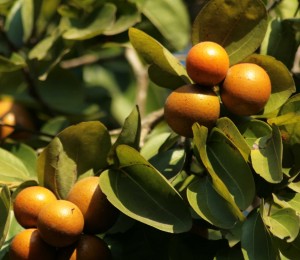Ignatia is a homeopathic remedy that is derived from the bean of a small tree that is native to the Philippine Islands and China.
Contents
Uses
- The bean was then used as a treatment for gout, epilepsy , cholera, and asthma .
Benefits
- Ignatia is one of the best remedies for conditions brought about by emotional upset such as grief, shock, jealousy, fear, anger, depression , embarrassment, fright, or ridicule. Homeopaths frequently recommend ignatia when the patient is suffering from romantic disappointment or the loss of a spouse, relative, friend, or pet. The remedy helps the patient bear the grief and suffering common to emotional upsets.
- Persons who require the interaction of Ignatia are idealistic, introspective, moody, quarrelsome, sensitive to pain , timid, easily startled, weepy, and depressed. As a result of their grief they become fearful, apprehensive, and antisocial. They dislike consolation and desire to be alone. When in the company of others they are secretive and try to hold in their emotions, although they sigh frequently and loudly. When alone, they are prone to frequent bouts of sobbing alternating with nervous laughter. They are conscientious about performing tasks correctly.
- Ignatia is a remedy of contradictions. It is used to treat symptoms that are often paradoxical and erratic. For example, symptoms of nausea are relieved by eating, a sore throat is better from swallowing solids, and simple foods are harder to digest than heavier foods. Symptoms may be relieved after passing a hard stool. Lying on the painful side may make the symptoms better. Eating causes the patient to have more hunger. She may crave sour or hard to digest foods. She may also want to remain uncovered when cold. The patient dislikes fresh air and is sensitive to coffee and tobacco.
- General symptoms are aggravated by cold air, emotional excitement, mental exertion, sweets, and consolation. They are worse in the morning, evening, night, and before and during menstruation . Symptoms may appear at regular intervals, such as headaches that occur every seven days. Symptoms are improved by warmth and eating.
Ignatia is also used as a remedy for headaches, sore throat, trembling, nervousness, insomnia , heart palpitations, gas, indigestion , weakness, and weeping. Other conditions include irritable bowel syndrome , painful hemorrhoids , or a dry, tickling cough .
- The cough is a dry, irritating cough that is often accompanied by a stitching pain in the chest. Suppression of the cough is helpful. The patient is made worse by coughing or lying in bed, and the cough is worse in the evening. Ignatia is often used in the treatment of whooping cough or croup
- The fever is often accompanied by extreme thirst and chills . The patient feels better when uncovered, and is worse in the afternoon.
Cautions
- The only side effects are individual aggravations that may occur.
Interactions
- When taking any homeopathic remedy, do not use peppermint products, coffee, or alcohol. These products may cause the remedy to be ineffective.
Other names
Bean of St. Ignatius, Fiève de Saint-Ignance, Habas de San Ignacio, Ignatia, Lu Song Guo, Saint Ignatius-beans, Strychnos ignatii, Strychnos tieute.
References
Encyclopedia, http://www.encyclopedia.com/doc/1G2-3435100416.html

